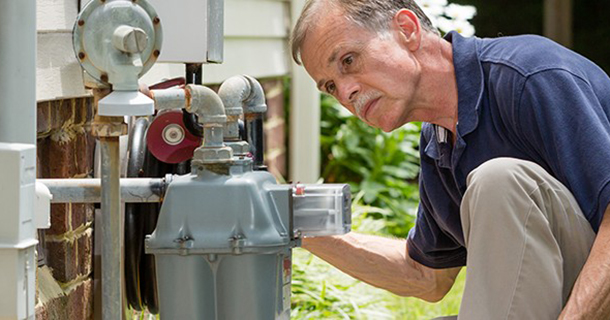Appliance and Equipment Safety
Keep your natural gas appliances and/or equipment in good working condition by following these safety tips:
- Keep your natural gas appliances and equipment maintained and in good working order by having them cleaned and/or inspected for safety once a year by a certified natural gas contractor/HVAC technician. Find one in your area.
- Gas appliances should have proper air circulation at all times.
- A gas flame should burn bright blue. A yellow or orange flame could indicate improper combustion or venting. Have your appliance checked by a certified contractor if you believe your system is not working properly.
- Keep flammable or combustible items away from gas appliances and equipment.
- Use natural gas equipment only for what it's designed to do. For example, you should never use a stove or oven for heating.
- Buy only natural gas equipment that has the American Gas Association Blue Star Seal of Approval, which shows that the appliance meets strict safety standards.
Pipeline Safety
At Virginia Natural Gas, our priority is the safety of our customers and our employees. We are committed to maintaining a safe and reliable natural gas pipeline infrastructure that serves the needs of customers, including emergency preparedness.
We work closely with local/regional emergency response officials located near our pipeline facilities to ensure a better understanding of the nature of our infrastructure and our emergency preparedness plans.
Pipeline security depends on all of us. If you see any of the following related to pipeline facilities, please call 757.455.5326.
- Holes in fences or open gates
- Suspicious or illegally parked vehicles on property
- Persons on or near property taking pictures
- Drones above company properties
- Unattended bags or packages
- Suspicious equipment left in open areas or hidden, such as placed in buckets or cans
See something? Say something.
Severe Weather Safety
Learn about the steps you can take before and after a storm to stay safe.
Learn MoreSewer Line Safety
When dealing with a sewer blockage, there is a remote, yet potentially hazardous condition that could be created when dealing with a sewer blockage.
Directional Boring and Cross Bores
Utilities use a trenchless technology called horizontal directional drilling (or directional boring) to pull cables, conduit and pipe underground. This installation method causes minimal impact to the surrounding area and minimizes environmental disruption. It also saves time, allowing utility crews to work more efficiently. There are instances when an underground sewer line is not properly identified prior to directional boring activities and it’s possible that a natural gas pipe can be inadvertently pulled through a sewer line. The resulting condition is known as a “cross bore.” Cross bores can go unnoticed for months or even years. They are typically discovered when it becomes necessary to clear a sewer line blockage.
If a natural gas pipe has been bored through the sewer line, the gas pipeline could be damaged, resulting in a loss of service and a potentially hazardous leak condition. If you are aware of the existence of a cross bore, call Virginia Natural Gas at 877.572.3342 and report it as a natural gas emergency.
Removing Sewer Blockage Safety
Learn what to do if you believe you have damaged a gas pipe in a sewer line
Learn MoreSafety Data Sheet
Safety is our number one value. That’s why we go beyond state and federal requirements when it comes to educating the public and our customers about natural gas and safety.
Excess Flow Valve
We carefully maintain a network of natural gas mains and service pipelines that deliver safe and reliable natural gas to the communities we serve.



